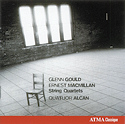 Do all good things come to those who wait? This month I really had no idea what I was going to write about until the arrival of two discs from ATMA which brought back musical memories from my formative years. The first was the Alcan Quartet performing string quartets of Ernest MacMillan and Glenn Gould (ATMA ACD2-2596). These two important Canadian works are rarely performed although there have been a few recordings over the years. MacMillan began work on the String Quartet in c minor while interned as a civilian prisoner in Germany during the First World War. He had been attending the Wagner Festival in Bayreuth at time the war broke out. Although the quartet shows some influence of Ravel and Debussy – MacMillan had been in Paris before heading to Bayreuth – it most firmly reflects the composer’s roots in the English school of the time. It is charming and well-crafted and ever since first hearing it some four decades ago on a Deutsche Grammophon recording by the renowned Amadeus Quartet I have wondered why it has not become a staple of the repertoire. The Gould quartet, completed in 1955, is a bit problematic. An extended single movement work lasting more than half an hour, it is a brooding backward-looking piece which reflects Gould’s interest in the early works of Schoenberg and the New Viennese School as well as Brahms and Richard Strauss. There are fugal elements, as we would expect from someone who spent his life immersed in the work of Bach, and occasional sunny bits, but for the most part this is a dark and at times troubling piece. The Alcan plays both works with passion and conviction. Their sound is captured in full fidelity by producer-recordist Anne-Marie Sylvestre in the warm acoustic of Salle Françoys-Bernier at Domaine Forget. The recording also includes MacMillan’s most frequently performed instrumental work “Two Sketches on French Canadian Airs” with the rollicking waves of “À Saint Malo” bringing the disc to a vibrant conclusion.
Do all good things come to those who wait? This month I really had no idea what I was going to write about until the arrival of two discs from ATMA which brought back musical memories from my formative years. The first was the Alcan Quartet performing string quartets of Ernest MacMillan and Glenn Gould (ATMA ACD2-2596). These two important Canadian works are rarely performed although there have been a few recordings over the years. MacMillan began work on the String Quartet in c minor while interned as a civilian prisoner in Germany during the First World War. He had been attending the Wagner Festival in Bayreuth at time the war broke out. Although the quartet shows some influence of Ravel and Debussy – MacMillan had been in Paris before heading to Bayreuth – it most firmly reflects the composer’s roots in the English school of the time. It is charming and well-crafted and ever since first hearing it some four decades ago on a Deutsche Grammophon recording by the renowned Amadeus Quartet I have wondered why it has not become a staple of the repertoire. The Gould quartet, completed in 1955, is a bit problematic. An extended single movement work lasting more than half an hour, it is a brooding backward-looking piece which reflects Gould’s interest in the early works of Schoenberg and the New Viennese School as well as Brahms and Richard Strauss. There are fugal elements, as we would expect from someone who spent his life immersed in the work of Bach, and occasional sunny bits, but for the most part this is a dark and at times troubling piece. The Alcan plays both works with passion and conviction. Their sound is captured in full fidelity by producer-recordist Anne-Marie Sylvestre in the warm acoustic of Salle Françoys-Bernier at Domaine Forget. The recording also includes MacMillan’s most frequently performed instrumental work “Two Sketches on French Canadian Airs” with the rollicking waves of “À Saint Malo” bringing the disc to a vibrant conclusion.
Glenn Gould/ Sir Ernest Macmillan: String Quartets![]()
At Grigorian.com
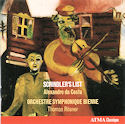 One of my most important early classical memories is from a rehearsal I was privileged to attend at Hart House back in my high school years. Walter Babiak was conducting a string orchestra in Ernest Bloch’s Concerto Grosso No.1. I’m afraid I can’t remember who the pianist was on that occasion (it’s an obbligato role rather than a virtuosic one) but the work was imprinted on my brain and left a lasting impression. Once again I cannot understand why this piece is not more frequently performed and so it was a great pleasure to find it included on the new CD Schindler’s List (ATMA ACD2-2579) featuring the Swiss Orchestre Symphonique Bienne. The title work is John Williams’ suite for violin and orchestra extrapolated from the soundtrack to “Schindler’s List”. Both that and Bloch’s “Suite Hébraïque” feature the outstanding young Canadian violinist Alexandre da Costa who is in fine form here. But the highlight for me is the performance of Bloch’s Concerto Grosso under the direction Thomas Rösner who captures the rustic energy of the dance movements and brings a driving force to the fugal finale without sacrificing any of the inherent stateliness of the work. And in this instance I can tell you the name of the pianist, Marc Pantillon.
One of my most important early classical memories is from a rehearsal I was privileged to attend at Hart House back in my high school years. Walter Babiak was conducting a string orchestra in Ernest Bloch’s Concerto Grosso No.1. I’m afraid I can’t remember who the pianist was on that occasion (it’s an obbligato role rather than a virtuosic one) but the work was imprinted on my brain and left a lasting impression. Once again I cannot understand why this piece is not more frequently performed and so it was a great pleasure to find it included on the new CD Schindler’s List (ATMA ACD2-2579) featuring the Swiss Orchestre Symphonique Bienne. The title work is John Williams’ suite for violin and orchestra extrapolated from the soundtrack to “Schindler’s List”. Both that and Bloch’s “Suite Hébraïque” feature the outstanding young Canadian violinist Alexandre da Costa who is in fine form here. But the highlight for me is the performance of Bloch’s Concerto Grosso under the direction Thomas Rösner who captures the rustic energy of the dance movements and brings a driving force to the fugal finale without sacrificing any of the inherent stateliness of the work. And in this instance I can tell you the name of the pianist, Marc Pantillon.
Alexandre Da Costa: Schindler's List![]()
At Grigorian.com
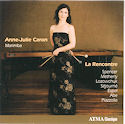 The ATMA package also included an eclectic offering entitled La Rencontre (ATMA ACD2-2608) featuring Anne-Julie Caron, a young marimba player who won the Quebec Opus Prize for “Discovery of the Year” in 2007. The disc includes original works by American marimbist-composer Julie Spencer, Ukrainian-Canadian composer Oleksa Lozowchu, French percussionist Emmanuel Séjourné, Argentinean guitarist-composer Guillio Espel and Japanese marimba virtuoso Keiko Abe, along with Caron’s own transcriptions of works by Pat Metheny and Astor Piazzola. Many of the works show influences of jazz and folk-dance rhythms, but there are moments of contemplation and abstract expression too. The highlight for me is Abe’s complex depiction of “Wind in the Bamboo Grove”. Caron proves herself up for the challenges throughout this intriguing recording.
The ATMA package also included an eclectic offering entitled La Rencontre (ATMA ACD2-2608) featuring Anne-Julie Caron, a young marimba player who won the Quebec Opus Prize for “Discovery of the Year” in 2007. The disc includes original works by American marimbist-composer Julie Spencer, Ukrainian-Canadian composer Oleksa Lozowchu, French percussionist Emmanuel Séjourné, Argentinean guitarist-composer Guillio Espel and Japanese marimba virtuoso Keiko Abe, along with Caron’s own transcriptions of works by Pat Metheny and Astor Piazzola. Many of the works show influences of jazz and folk-dance rhythms, but there are moments of contemplation and abstract expression too. The highlight for me is Abe’s complex depiction of “Wind in the Bamboo Grove”. Caron proves herself up for the challenges throughout this intriguing recording.
Anne-julie Caron: La Rencontre![]()
At Grigorian.com
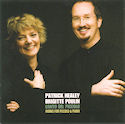 When I first saw the next disc I must admit I cringed at the thought of more than an hour’s music for just piccolo and piano. The piccolo’s register is so high and its timbre so often shrill that I could not imagine listening to the disc in its entirety. But I was amazed to find that after the first listening I went back and put it on again. National Arts Centre Orchestra piccolo player Patrick Healey (aided here by Montreal accompanist extraordinaire Brigitte Poulin) is a truly accomplished performer and the repertoire he has chosen to showcase his instrument is very effective. I was not previously familiar with any of the composers on this disc except Denis Gougeon whose Canto del Piccolo both concludes and provides the title for this disc (XXI-CD2 1620). Perhaps living composers Frank Hannaway, Cecilia McDowall, Michael Isaacson, Mike Mower, and the late Alan Ridout are well known in the flute world. They certainly should be if this disc is any indication.
When I first saw the next disc I must admit I cringed at the thought of more than an hour’s music for just piccolo and piano. The piccolo’s register is so high and its timbre so often shrill that I could not imagine listening to the disc in its entirety. But I was amazed to find that after the first listening I went back and put it on again. National Arts Centre Orchestra piccolo player Patrick Healey (aided here by Montreal accompanist extraordinaire Brigitte Poulin) is a truly accomplished performer and the repertoire he has chosen to showcase his instrument is very effective. I was not previously familiar with any of the composers on this disc except Denis Gougeon whose Canto del Piccolo both concludes and provides the title for this disc (XXI-CD2 1620). Perhaps living composers Frank Hannaway, Cecilia McDowall, Michael Isaacson, Mike Mower, and the late Alan Ridout are well known in the flute world. They certainly should be if this disc is any indication.
Patrick Healy & Brigitte Poulin: Canto Del Piccolo![]()
At Grigorian.com
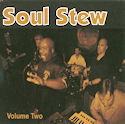 My Guilty Pleasure of the month? Soul Stew Volume Two. Produced by bass player Roberto Occhipinti for Modica Music (www.modicamusic.com), this CD features covers of some of the most iconic R&B tunes of the 70s and 80s soulfully sung by Michael Dunston. Soul Stew was formed in 1990 and served as house band at the Bamboo Club and later at The College Street Bar. The current offering was recorded “live off the floor” at MacLear Studio several years ago, but mixed and mastered by John “Beetle” Bailey in February 2009 and launched at Lula Lounge last month. The disc proved to be the perfect soundtrack for a drive in the country recently, with its powerful rhythm section provided by Occhipinti and drummer Mark Kelso complemented by Matt Horner’s omnipresent Hammond organ, David Gray’s tasty guitar licks and John Johnson’s funky saxes. And if you think maybe you’d need a bigger horn section to do justice to some of Motown’s greatest hits, have no fear because the band was filled out by Dave Dunlop and Terry Promane on trumpet and trombone for this session. Dunston convincingly makes familiar songs by Sly Stone, Al Green, Billy Paul, Marvin Gaye, James Brown and even Stevie Wonder his own. The whole car was singing along.
My Guilty Pleasure of the month? Soul Stew Volume Two. Produced by bass player Roberto Occhipinti for Modica Music (www.modicamusic.com), this CD features covers of some of the most iconic R&B tunes of the 70s and 80s soulfully sung by Michael Dunston. Soul Stew was formed in 1990 and served as house band at the Bamboo Club and later at The College Street Bar. The current offering was recorded “live off the floor” at MacLear Studio several years ago, but mixed and mastered by John “Beetle” Bailey in February 2009 and launched at Lula Lounge last month. The disc proved to be the perfect soundtrack for a drive in the country recently, with its powerful rhythm section provided by Occhipinti and drummer Mark Kelso complemented by Matt Horner’s omnipresent Hammond organ, David Gray’s tasty guitar licks and John Johnson’s funky saxes. And if you think maybe you’d need a bigger horn section to do justice to some of Motown’s greatest hits, have no fear because the band was filled out by Dave Dunlop and Terry Promane on trumpet and trombone for this session. Dunston convincingly makes familiar songs by Sly Stone, Al Green, Billy Paul, Marvin Gaye, James Brown and even Stevie Wonder his own. The whole car was singing along.
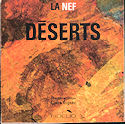 I mentioned that marimba player Anne-Julie Caron won an Opus Prize in 2007. The 2008 Opus Prize for “Jazz and World Music Concert of the Year” went to Montreal group La Nef for the project Déserts, subtitled “creative music inspired by the deserts of the world”. La Nef is dedicated to creating and producing early, world, and original musics through collaborations with musicians from eclectic backgrounds and artists from diverse disciplines. “Déserts” will be released on CD in April by the Fidelio label (www.fidelioaudio.com). Concert note: You can hear La Nef at the Music Gallery here in Toronto on April 7 when internationally renowned tambourine virtuoso (?!) Carlo Rizzo joins Claire Gignac (Artistic Director and flutes), Patrick Graham (Musical Co-Director and multiple-percussion), Andrew Wells-Oberegger (oud, saz, guembri, zhong ruan and percussion) and Toronto-based Ben Grossman (electroacoustic hurdy-gurdy and percussion) for a program entitled “Skin – A Percussion Blitz”.
I mentioned that marimba player Anne-Julie Caron won an Opus Prize in 2007. The 2008 Opus Prize for “Jazz and World Music Concert of the Year” went to Montreal group La Nef for the project Déserts, subtitled “creative music inspired by the deserts of the world”. La Nef is dedicated to creating and producing early, world, and original musics through collaborations with musicians from eclectic backgrounds and artists from diverse disciplines. “Déserts” will be released on CD in April by the Fidelio label (www.fidelioaudio.com). Concert note: You can hear La Nef at the Music Gallery here in Toronto on April 7 when internationally renowned tambourine virtuoso (?!) Carlo Rizzo joins Claire Gignac (Artistic Director and flutes), Patrick Graham (Musical Co-Director and multiple-percussion), Andrew Wells-Oberegger (oud, saz, guembri, zhong ruan and percussion) and Toronto-based Ben Grossman (electroacoustic hurdy-gurdy and percussion) for a program entitled “Skin – A Percussion Blitz”.
We welcome your feedback and invite submissions. CDs and comments should be sent to: The WholeNote, 503 – 720 Bathurst St. Toronto ON M5S 2R4. We also encourage you to visit our website, www.thewholenote.com, where you can find added features including direct links to performers, composers and record labels and “buy buttons” for on-line shopping.
David Olds
DISCoveries Editor
discoveries@thewholenote.com



